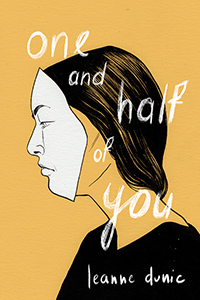Reviews
Poetry Review by Yvonne Blomer
Leanne Dunic, One and Half of You (Vancouver: Talonbooks, 2021). Paperbound, 81 pp., $16.95.
 Leanne Dunic’s book‐length poem, One and Half of You, begins with a
blur of faces, as a child might experience in a crowd: “them, and them,
and them. // Then more. Faces mixed. A pocket here, a // clan there.”
These opening lines prepare you for places and people, for mixed
races and mixed ancestry. The poems carry the essence of memoir in
their movement from image to dialogue, from contemplative fragment
to some semblance of catharsis.
Leanne Dunic’s book‐length poem, One and Half of You, begins with a
blur of faces, as a child might experience in a crowd: “them, and them,
and them. // Then more. Faces mixed. A pocket here, a // clan there.”
These opening lines prepare you for places and people, for mixed
races and mixed ancestry. The poems carry the essence of memoir in
their movement from image to dialogue, from contemplative fragment
to some semblance of catharsis.
Identity is at the heart of this book: race, sexual, settler, but also the
narrator’s identity in her family, her neighbourhood, her school. Using
the Chinese Zodiac, Dunic gives us the main characters—narrator as
Dog, brother as Rat, and as‐of‐yet‐unmet lover as Snake. Images of
these creatures appear in play and in dreams from the get‐go, allowing
the animals and the people they represent to weave through her conscious
and subconscious life. Dunic’s narrator explores who she is to
herself (“Part pug? Shih Tzu? Pekingese? Definitely / of Chinese
descent”); to her brother (“The girl will never be Asian. They remind /
me too much of you”); in terms of her sexual identity (“I was pretty sure
I was a girl / but didn’t understand why I wanted to kiss / boys and
girls”); and in regard to her complicated love of her brother and how
to find/leave that love to love another (“I don’t want to hear about you
having sex,” he says).
What opened in me as I read One and Half of You is as complex as
the times we are living in, where identity and crisis hold hands. “Who
am I, living on Tsartlip land in Canada?” this narrator of Asian‐European
descent asks. How can she know who she is with so many
opinions flying at her, so many assumptions about how she looks—
Indian, Indigenous, too Asian, too tall? Here is an exploration of liminality
in a world that constantly others this narrator. “I have / two
halves // mountains I try / to move.” And while she is in the
process of self‐discovery, COVID‐19 hits, and anti‐Asian violence
crashes into her, captured in a poem of headlines: “Vancouver’s Chinatown
lions defaced with anti‐Asian COVID….”
As a multi‐disciplinary artist, Dunic skillfully blends forms, poetry
and memoir, to create a lyric memoir. Memoir, I have been known to say, is poetry’s closest cousin. Both are concerned with the “truth” of
things, and Dunic beautifully captures her experiences through fragmented
images and dialogue that are essentially poetry. The nuance
of experience as it shifts into art has the allure of both forms.
The book is divided into three numbered sections. Early poems
tackle adolescence and racial identity, where she and her brother
search for themselves in popular references, “The Nutcracker on TV. Of
course, my / brother pretended he was the Rat King. I / hoped for my
own whiteness and a prince.”
Later, she crosses the strait to live in Vancouver, and lives in other
places: “I dwelled in the Chinatowns of port cities. / Victoria, Vancouver,
stints in Singapore.” No matter where she lives, her ancestry draws
comments: “In Cantonese, the clerk yells, <Check out // this beautiful girl up front!> // <Bet her mother is Chinese.>” And even when she’s
across the world, her brother lingers, “<I know you.> // Impossible. //
<You’re his sister> // (A model Rat dated for a weekend.).”
The quoted lines above capture the many layers of speakers and
story that propel this book. The way Dunic marks quoted speech—
italics for the brother, angle brackets for outsiders—allows clipped
fragments of dialogue to become important as in the word “impossible” above; even though she doesn’t think she looks anything like
her brother, she is recognized as his sister from someone across the
world. And then in the parenthetical aside, she tosses this woman
away. Dunic’s use of fragments, white space, and speech allows few
words to carry more meaning.
In sections two and three there is a shift into the sea and images of
the ocean, and her desire to “peer beneath” the surface of things. While
her brother can vanish into the life he’s made for himself, she stands
out, too tall, too other, until she meets another like her. The last section
is the shortest, focusing on the narrator and the sea, immersed and
grieving, with a final poem‐fragment set in Vancouver where Chinatown
is vanishing and her brother marries, has children. Loss and
change permeate the final poems.
The title One and Half of You is complex and evocative. Who is this
woman? She is herself and half of another—her brother at times, her
lover at times. Her desires are interlinked to her sense of who she is,
which is in constant crisis. We have moved around, colonized, entered
every corner of the globe, and touched every environment. We have
enabled COVID‐19, and we use difference as an excuse for hate and fear.
A book is a small vessel to carry so much, but Dunic’s craft holds the
nuance and confusion of a complex narrator in impossible times.
—Yvonne Blomer









